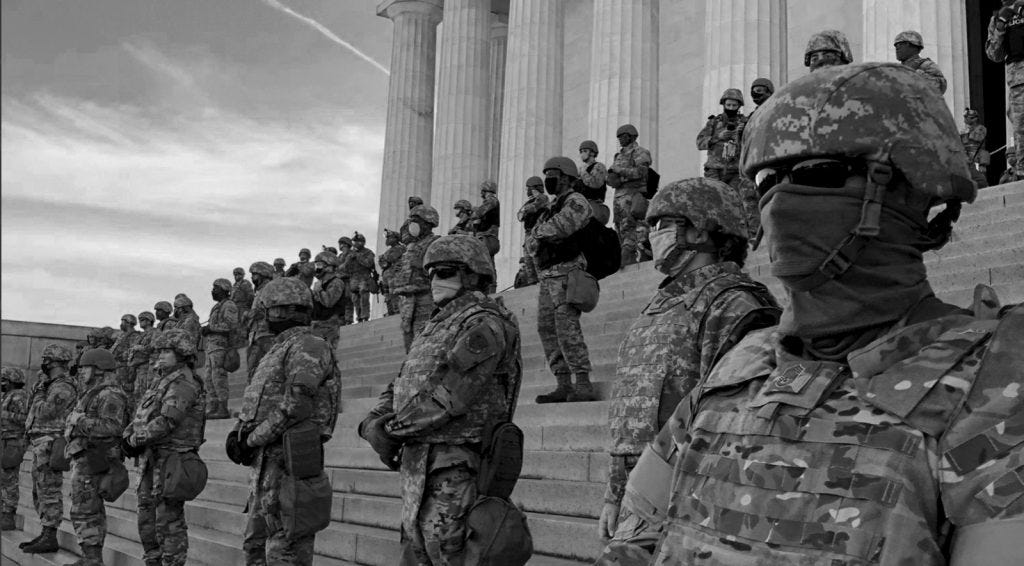How the Fuck Did We Let Our Military Become a Cult of Personal Loyalty?
The Consequences of Military Leadership Forsaking the Constitution for a Singular Man
Last week, when Donald Trump fired Air Force Gen. CQ Brown Jr., the Chairman of the Joint Chiefs of Staff, it wasn’t about military strategy, competency, or even ideology. It was about loyalty. His brand of loyalty demanded that every leader in the armed forces swear allegiance not to the Constitution they swore to defend, but to one authoritarian figure. And with six military branch heads dismissed and top legal advisors ousted from the Department of Defense, it became clear: this was no routine personnel change. This was a purge.
Gen. Brown’s removal sent shockwaves throughout the Pentagon. As only the second African American general to hold the position, his legacy was defined by his bold, principled stand—marked not by battlefield failures but by the courage to defy a politicized agenda. His public support for Black Lives Matter had already painted a target on his back, and his dismissal was just the opening salvo in a wider purge.
In addition to Brown's removal, six military branch heads—among them Adm. Lisa Franchetti, the Navy’s top officer and the first woman to become Chief Naval Officer and join the Joint Chiefs of Staff, dismissed by Hegseth—along with the department’s leading legal advisors, were also ousted. Trump further escalated the assault by firing the boards of visitors from every U.S. service academy, alleging that “woke” ideology had infiltrated these training grounds for future military leaders.
This was no routine shakeup; it was a systematic purge of anyone whose loyalty lay with the Constitution they swore to defend, rather than with a single authoritarian figure.
The military leaders being removed aren’t unqualified or insubordinate; they simply refuse to bow to an authoritarian whim.
And if this sounds familiar, it should: throughout history, strongmen have consolidated power by bending the military to their will, paving the way for fascism.
So I have to ask: What happens when the military—the guardian of our freedoms—is led by men whose primary allegiance is to an autocrat? What kind of future are we building when the very institution that is supposed to protect us is being reprogrammed?
A Military Once Bound by Duty Is Now Being Reprogrammed
When I raised my right hand and swore my oath, I believed I was stepping into something larger than myself. I joined the military driven by a mix of patriotism, a desire for personal growth, and the need to honor the memory of 9/11 by protecting my country. I believed I was signing up to be one of the good guys—a defender of a living, breathing Constitution.

But today, as I watch military recruitment posters and hear the slogans echoing in our culture, I wonder: What are our 18-year-olds signing up for now?
Over the decades, the motivations for joining the armed forces have shifted. After 9/11, recruits answered the call with pure patriotism. In the post-recession era, financial security became a driving force. But now, in the wake of Trump’s rhetoric, a radical subset of recruits is being drawn in not by duty, but by nationalist grievance and a culture war that has transformed the military from a civic institution into a battlefield for ideology.
I joined with the expectation of serving for life—a commitment rooted in duty and honor. Instead, I discovered that the institution I once believed to be my calling turned against me as a woman, a mother, and a dissenter who challenged authoritarian leadership and predatory behavior. While serving as a Sexual Assault Response Coordinator under the first Trump administration, I witnessed a betrayal so profound it shattered my faith. Victims, whose stories demanded justice, were forced to report within a chain of command led by known sexual abusers.
And then came the gutting of Diversity, Equity, and Inclusion (DEI) programs—a move that wasn’t merely political but transformative. No longer was the military a meritocracy dedicated to recruiting the best and brightest from every background. Instead, it was being reshaped as a tool for a culture war, where ideological purity supplanted independent thinking.
When leaders who stood for principled service are replaced by loyalists selected solely for their willingness to conform, a question arises: Who is really being recruited? And what will they be asked to fight for?
The Dangerous Road Ahead
Consider the military oath:
“I do solemnly swear that I will support and defend the Constitution of the United States against all enemies, foreign and domestic…”
When loyalty shifts from the Constitution to a single man, especially one that is publicly motivating a Christian Nationalist agenda, that oath loses its meaning. A military led by sycophants—leaders who follow orders without question—is poised to carry out illegal directives. When the chain of command is populated with ideologues rather than strategic thinkers, we may find ourselves in a situation where the armed forces, once the bulwark of democratic freedoms, becomes an instrument of repression against the very citizens it’s meant to protect.
Imagine an 18-year-old recruit dutifully memorizing a chain of command that includes a president infamous for crude, misogynistic remarks, a Secretary of Defense whose record is marred by abuse and incompetence, and a commandant chosen solely for personal allegiance. What kind of military does that create? One built on the shaky pillars of personal loyalty rather than the enduring promise of service and constitutional duty.
And then there’s the looming threat of martial law. Picture a scenario where dissent is not only silenced but suppressed by a military whose only guiding principle is unwavering loyalty to a leader. What if, in the name of maintaining order, this force is ordered to shut down free speech, arrest protesters, or even suppress its own citizens? The consequences are chilling—a society where fear, rather than freedom, reigns.
The Cost of an Unchecked, Loyalist Military
The radical restructuring of our military isn’t a matter of isolated policy—it’s a systemic overhaul with profound implications for all of us. When loyalty is the prime qualification, the military becomes vulnerable to orders that violate the very freedoms it is meant to protect. The possibility of martial law—a state of emergency where military power supersedes civil rights—ceases to be a distant dystopia and becomes an imminent threat.
Imagine a future where dissent is labeled as treason, where soldiers, trained to follow orders without question, are ordered to suppress protests or detain citizens. The chilling prospect of a military that would not hesitate to act against its own people must make us question: What is the true cost of this shift? Is it worth sacrificing our fundamental freedoms for the sake of an ideological purity that benefits only a select few?
For those of us who served, who believed in the honor of our oaths, this transformation is deeply personal. It is a betrayal of the very values we swore to uphold. And for the citizens who place their trust in the military as a safeguard of liberty, it is a stark warning: The institution that once stood for protection may soon be the one enforcing oppression.
What’s At Risk?
Each purge of leaders who uphold constitutional duty sends a stark message: personal allegiance is now prized over shared ideals. This shift creates a system that rewards obedience at the expense of accountability and independent thought.
We stand at a critical juncture. It is time to expose these dangerous patterns, demand transparency, and insist that our military recommit to its core values: honor, courage, and a steadfast adherence to the Constitution. We must ask ourselves: Are we willing to risk our freedoms for an ideological crusade, or will we unite to restore the promise of democracy?
If we allow this dangerous trajectory to continue unchecked, we risk a future where free speech, civil rights, and personal autonomy are nothing more than distant memories.
Now is the time to act—demand accountability, insist on transparency, and never lose sight of the freedoms we must protect.
So, as you read this, I urge you to reflect: What kind of military do you envision? One that upholds the values that built our nation, or one that yields to the whims of a select few? And if you value the freedoms we cherish, what are you willing to do to safeguard them?
Because if we fail to ask these questions and challenge the status quo, we may one day find ourselves fearing the institutions meant to protect us: How the fuck did we get here?
About the Author
I’m Alisa Sieber—a writer, veteran, and relentless question-asker, exposing the patterns of power, control, and resistance that shape our world. My work blends personal reckoning with systemic critique, challenging the narratives we’ve been told and demanding we ask harder questions.
Share How the Fuck Did We Get Here?
How the Fuck Did We Get Here? is a deep dive into the systems failing us, the leaders gaslighting us, and the patterns of control we can’t afford to ignore. If this article resonated with you, share it with someone who needs to see the bigger picture.
Subscribe to How the Fuck Did We Get Here?
A new How the Fuck Did We Get Here? is published every Monday at 9 AM PST. Subscribe to stay informed, stay questioning, and never look away.
Also Read: How the Fuck Did I Get Here?
If you’re interested in personal storytelling, breaking generational cycles, and reckoning with trauma, identity, and resilience, check out my other series, How the Fuck Did I Get Here?.
This series explores the deeply personal side of survival and transformation—where I ask not just how the world got here, but how I did.
A new HTFDIGH essay drops every Friday at 9 AM PST.
👉 Read How the Fuck Did I Get Here?
🔗 Connect with Me
📲 Instagram: @alisa.sieber
🌍 Bluesky: @alisasieber.bsky.social
💬 Leave a comment below—I’d love to hear your thoughts.






